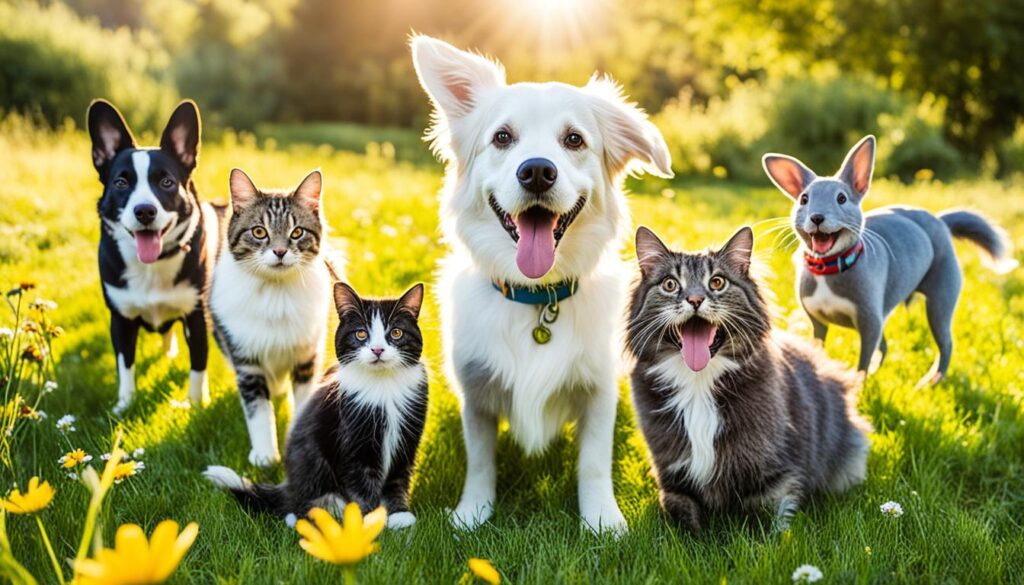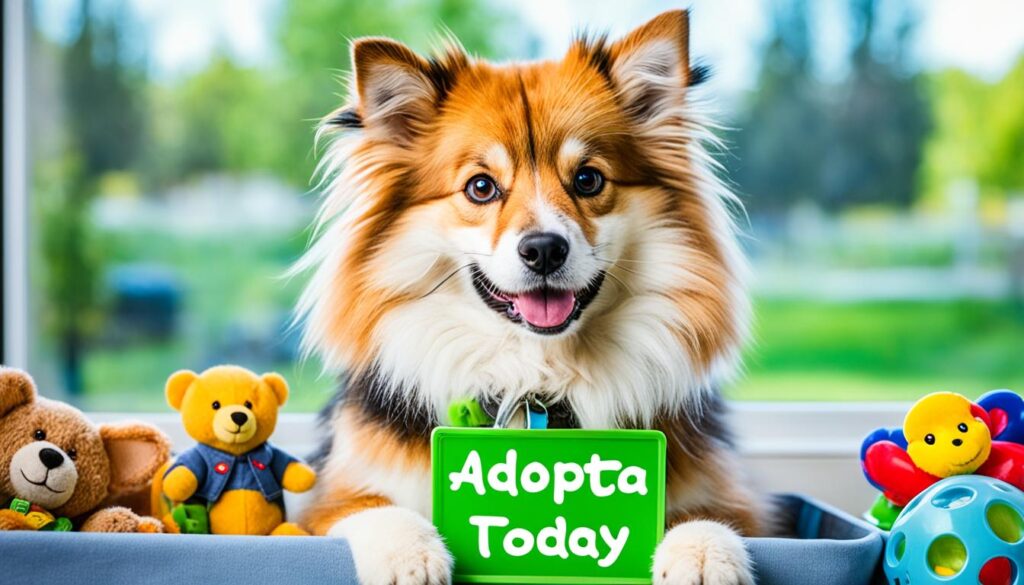Are you ready to welcome a pet into your life? Animal adoption is a wonderful way to do it. It gives a home to a shelter animal that needs love. But what is animal adoption all about? How does it help you and these special animals?
Choosing to adopt lets you give a second chance to shelter pets.1 It’s a heartwarming experience, adding a new member to your family. At the same time, you’re doing your part to help shelters and animals in need.1
Key Takeaways
- Animal adoption provides loving, deserving shelter pets with a second chance at a forever home.
- Adopting a pet can be a joyful and rewarding experience, reducing overpopulation in shelters.
- By adopting, you’re making a positive impact on animal welfare and giving a homeless animal a loving home.
- Adopting a pet can provide companionship and unconditional love, with benefits for your mental and physical health.
- Choosing to adopt helps reduce the overwhelming number of homeless pets that end up in shelters or euthanized each year.
Why Adopt a Pet?
Choosing a pet from a shelter or rescue means giving a home to a pet in need.2 These animals often don’t have a safe place and face an uncertain future. By adopting, you’re opening your heart and home to a deserving furry friend.3
The benefits of bringing a pet into your life are huge. Pets offer love and companionship. They can also improve your mental and physical well-being.3
Giving Shelter Animals a Second Chance
2 Sadly, many shelter dogs and cats meet a grim end because there aren’t enough homes for them. Choosing adoption is a way to change this story. It gives a pet the chance at a loving home.
The Joys of Pet Parenthood
3 Pets are great stress-busters. They lower stress, anxiety levels, and even your blood pressure.3 Contrary to some beliefs, dogs adopted from shelters can be very loyal. In fact, 85% of owners feel a strong bond with their adopted dogs.
Reducing Overpopulation in Shelters
2 Thousands of puppy mills across the U.S. add to the problem. Animals from these places often have health and social issues. By adopting, you are part of the solution, helping to lessen the burden on shelters.3 Sadly, about 1.5 million shelter animals are put down each year because there’s not enough room for them.
Preparing for Your New Furry Companion
Getting a new pet is exciting and rewarding. But, it needs preparation for a smooth start. Whether from a shelter or a rescue, steps are necessary. These steps make your new pet feel at home quickly.
Checklist for New Adopters
For new adopters, the checklist is crucial. It includes food and water bowls, bedding, toys, and grooming items.4 Having a safe space for your pet is key. This is their retreat until they’re ready to explore more. Making your home safe with pet-proofing also matters. Secure loose wires and remove harmful plants. This ensures a safe place for your new pet.4
Transition Tips for a Smooth Homecoming
These tips will help your new pet settle in.5 Experts, like adoption counselors, vets, and trainers, can help match you with the right pet. They also give advice for your pet’s first days.
Creating a small and secure space for your pet is recommended.5 It helps them feel safer as they adjust. Keeping a routine for food, exercise, and sleep is also good. This makes your pet feel supported and happy.5
By readying your home and following these tips, your pet will quickly adjust.45 Adopting a pet is a wonderful thing. It brings joy to your life and gives an animal a loving home.
COVID-19 and Animal Adoption
The COVID-19 pandemic has changed how we adopt animals. Shelters and rescue groups have found new ways to help homeless pets.6 In April 2020, adoption of pets was at its highest since the pandemic began, especially in the United States. The interest in dog adoption worldwide peaked in April but dropped back to normal by the end of 2020. However, the demand for cat adoptions continued to stay high.6
How Shelters and Rescue Groups Are Adapting
Shelters and rescue groups are making it easier to adopt pets, yet keeping everyone safe. They use virtual tours, curbside pickups, and strict safety rules. These new methods help save animal lives despite the challenges of the pandemic.
Ways to Support Pet Welfare During the Pandemic
Even with the pandemic, there are many ways to help animals. You can foster, donate, or support animal rescue causes. This help is critical for shelter animals looking for their forever furry friends.7 Research shows that pets from shelters are less likely to be given up, by almost 39%, than pets received as gifts.7
7 Those who got their pets just before the pandemic were three times more likely to think about giving them up.7 People who got pets after the pandemic were twice as likely to think about giving them away. This shows the challenges new pet owners faced because of the pandemic.7
6 Australia had the highest interest in pet adoption, while Singapore led in Asia with a ranking of 38. Cat adoption searches topped in Singapore at 100, with the US following at 68. An interesting fact is that Hong Kong saw fewer animal cruelty arrests in 2020’s first half, down from 2019’s total.6
You can help by supporting animal welfare groups, or by volunteering in rescue pets efforts. With this support, more shelter animals can find their permanent homes.
animal adoption
Choosing the Right Pet for Your Lifestyle
Choosing a pet that fits your life is key when thinking about adoption.8 Think about what you can offer and what you need. This includes the pet’s age, size, and how active they are.9 For someone always on the go, a high-energy pet might not be the best. But, a low-maintenance or older pet could be perfect.9 Make sure to match what you want with what the pet requires. This way, you’ll find a great pet to welcome into your home.
Considering Age, Size, and Energy Level
The age, size, and energy of a pet matter a lot when it comes to looking after them.9 Puppies and kittens are full of life but need a lot of care and training.9 On the other hand, older pets or those that are less active might be a better choice. This is especially true if you’re not available for play all the time.8 Knowing these details can make the adoption process easier and more enjoyable. It helps you create a happy, stress-free home for your new pet.
The Adoption Process
Adopting an animal starts by visiting a local animal shelter or rescue organization.10 There, you can meet potential furry friends. At the shelter, you’ll fill out an application and talk about your life with the staff.10 You’ll also learn about any fees which help with important services for your new pet. These can include spaying/neutering, microchipping, and the first veterinary care.11
What to Expect at the Shelter
Shelter visits give you a chance to meet pets for adoption.10 The staff will help you, answering questions and matching you with the right furry companion.10 If you’re anyone 17 years old or younger, bring an adult with you.10
Required Documents and Fees
There are fees for adopting that help your new pet get needed services.11 Fees are usually between $65 and $85 for dogs and cats. But, the amount might change based on the animal’s type and age.11 Some pets like working cats or senior animals over 7 years old might have no adoption fee.11 Also, there are discounts for people 55 and older.11
Knowing about the adoption process helps make everything smoother.10 Looking to adopt a dog, cat, or another animal? The shelter or rescue organization’s team will be with you from start to finish.11
Caring for Your Rescue Pet
Bringing a rescue pet home adds joy to your family. But, it brings big duties too. You must get them what they need for comfort and health first. Check out ACANA Rescue Care for Adopted Dogs. It offers special recipes, like the Red Meat Recipe and Poultry Recipe, for your pet’s diet.12
Essential Supplies and Gear
Besides good food, get your pet water and food bowls, a comfy bed or cozy crate, and grooming tools. Don’t forget fun toys too. Every purchase of ACANA Rescue Care for Adopted Dogs helps feed a shelter pet.12
Training and Socialization Tips
Teach and socialize your new pet from day one. ACANA’s special blend has what your pet needs. It offers immune boosters, skin and coat care, tasty bone broth, and digestion support. All these are great for your pet’s transition.12
Veterinary Care and Wellness
Make sure your pet sees the vet often. They need check-ups and care to stay healthy. ACANA Rescue’s recipes were made with vet advice. Dr. Darcia Kostiuk, a vet with much experience, leads the team.12 This food line helps shelter dogs feel secure and thrive in new homes.12
Success Stories and Heartwarming Tales
Adopting a pet brings joy and creates strong bonds. Many shelter and rescue animals have found their forever homes. They now enjoy a life filled with love and happiness.13 Once without hope, these pets have a chance for a better future. They bring happiness to those who adopt them.13
Sharing these stories inspires others to adopt. It encourages people to make a positive difference in a shelter pet’s life.
Furry Friends Who Found Their Forever Homes
The stories in this collection span from January 2019 to March 2020. They include many dog breeds, like Great Dane/Mastiff mixes and pit bulls.13 Some tales show dogs adjusting to their new families, needing extra love and care.13
The stories mention dogs who needed special health care. Others faced behavior challenges that required training and patience.13 The dogs’ ages vary from puppies to seniors, showing the range of pets available for adoption.13
There are even mentions of hospice adoptions, offering comfort and care to animals in their final days.13 Many dogs quickly found their forever homes, some within just a few weeks of arriving at the shelter.13
Supporting Animal Welfare Organizations
Animal welfare groups need their community’s help to save lives.14 They care for and help animals by giving them food, medical care, and a home. By helping these groups, you improve the lives of animals without a home.14
Volunteering Opportunities
There are many ways to help, like spending time cleaning, playing, or helping at events.14 Your help makes a big difference for animals looking for a family.15 Offering your skills and time supports these groups in giving the best care to the animals.
Donation Drives and Fundraising Events
You can also give support through money or items, at events, or through a company like Chewy.14 Chewy helps by providing food, which helps both shelter pets and those with homes. Their focus is on getting every pet a loving home.15 This work hugely affects how well shelters can help animals in search of a home.
Taking part in these helps real animals get real homes.15 If you care, there’s an invitation to act now and be part of something big for animals and people by 2025.15
Responsible Pet Ownership
Owning a pet wisely matters a lot. It’s key for both your pet’s happiness and the animal world’s well-being. Choosing to be a good pet owner means giving your pet proper care.16 Plus, you help other animals by keeping the shelters less crowded.
Spaying and Neutering Your Pet
Spaying or neutering your pet is crucial. This step stops surprise baby animals and lowers the number of pets in need.16 It’s a big way to fight overpopulation and make every pet’s life better.
Microchipping and Identification
Also, don’t forget to microchip your pet. It’s a safety net in case they ever get lost. A microchip helps you find them fast, keeping your family together.17 This step is vital for your pet’s safety and supports the good work of animal groups.
Being a good pet owner is very rewarding. You not only care for your pet well but also help many other animals.
From making sure they don’t have babies to finding them if they get lost, these actions are a big deal. They help your pet and the animal world at large.
Resources for New Pet Owners
Adopting a pet is thrilling and brings joy, but it means new duties too. Luckily, many resources exist to help new pet parents. This includes online groups and educational materials.
Online Communities and Support Groups
There’s a lot of info, advice, and friendly pet lovers in these online hubs.18 New pet owners can share experiences with more seasoned ones. They can ask questions and get great tips.18
Educational Materials and Training Guides
Educational materials and guides are also available. They help with everything from basic training to tricky behavior issues.19 Topics include what to feed pets, grooming, and vet visits. They make new pet owners more confident in their care.19
With all this support, new pet owners will feel ready to shower their pets with love and care. It’s all about creating deep bonds and a happy, healthy atmosphere for their new family member.
FAQ
Why should I consider adopting a pet?
Adopting a pet is a great way to help. You give them a second chance. Many shelter animals don’t know what their future holds. You can make their world better and find a forever friend.
It’s a joyful experience. Not only do you reduce shelter overpopulation, but you also enrich your life with a new family member. Adopting changes both your life and the animal’s for the better.
What should I do to prepare for my new furry companion?
Getting ready for your new pet is important. Make sure you have all the supplies they need ready. This includes food, water bowls, bedding, toys, and grooming tools.
Have a safe space ready for them at home. A slow introduction is best. This helps your pet feel safe and get to know their new home at their own pace.
How has the COVID-19 pandemic affected animal adoption?
The pandemic changed how we adopt animals. But shelters are finding new ways to help pets find homes. They now offer virtual tours and curbside pickups.
This is a tough time, but there are still ways to help. Consider fostering or donating to support animal rescue efforts. Together, we can make a difference.
How do I choose the right pet for my lifestyle?
Picking the right pet means understanding your limits and the pet’s needs. Think about the pet’s age, size, and energy level. These factors are key.
If you’re busy, a senior pet or one that needs less maintenance might be better. This way, both you and your furry friend are happy. Choose wisely to ensure a lifelong bond.
What can I expect during the adoption process?
When you’re ready to adopt, you’ll visit a shelter or rescue. You’ll meet a range of potential pets. Be ready to talk about your life and home.
Fees for adoption include important vet services. This helps ensure your pet’s health. Knowing what to expect makes the process smoother for you and your new pet.
How do I care for my adopted pet?
After adoption, your pet will need care and love. Make sure they have everything they need, like food and toys. Training and socialization are also crucial.
Regular vet visits are a must. They keep your pet healthy. By doing these things, your adopted pet will flourish in their new home.
How can I get involved in supporting animal welfare organizations?
Animals organizations need help from the community. You can volunteer or support them through donations. Every bit of help matters.
Your support means food, medical care, and the chance for a home for these animals. Get involved and make a big difference in their lives.
What are the responsibilities of responsible pet ownership?
Having a pet means taking good care of them. This includes spaying or neutering them to control the pet population. Also, make sure they are microchipped.
By looking after your pet well, you’re both happy and support animal welfare. It’s all part of being a caring pet owner.
What resources are available for new pet owners?
There are many help tools for new pet owners. You can find advice online or join a support group. These can help you with your new friend.
There are also many training materials. They cover everything, from basic obedience to common behavior problems. With these resources, you can be a great pet owner.
Source Links
- https://www.animalleague.org/
- https://resources.bestfriends.org/article/reasons-pet-adoption
- https://www.aspca.org/news/10-reasons-adopt-shelter-dog
- https://brawleyanimal.com/5-steps-pet-adoption-guide/
- https://njshelter.org/adopting-a-shelter-pet-expert-advice-to-prepare-your-home-for-your-new-furry-friend/
- https://www.frontiersin.org/articles/10.3389/fvets.2021.647308
- https://www.ncbi.nlm.nih.gov/pmc/articles/PMC9563850/
- https://www.princegeorgescountymd.gov/departments-offices/environment/animal-services/pet-adoption
- https://www.aacounty.org/animal-control/pet-adoption-fostering/animals-our-shelter
- https://www.animalhumanesociety.org/resource/how-adoption-works
- https://lifelineanimal.org/adoption-process/
- https://www.acana.com/en-US/acana-rescue-care-for-adopted-dogs/acana-rescue-care.html
- https://www.animalhumanesociety.org/news/our-10-most-heartwarming-dog-adoption-stories-2021-so-far
- https://www.humanesociety.org/resources/shelter-and-rescue-partners
- https://bestfriends.org/
- https://www.fourpawsusa.org/campaigns-topics/topics/help-for-strays/responsible-pet-ownership-program
- https://www.avma.org/resources-tools/avma-policies/guidelines-responsible-pet-ownership
- https://homewardpet.org/adopt/home-to-home-direct-adoption/
- https://liveloveanimalrescue.org/resources-for-pet-owners


